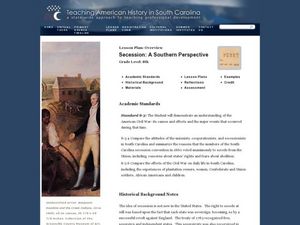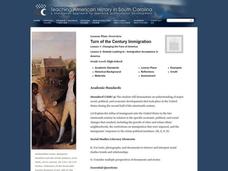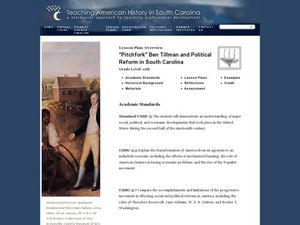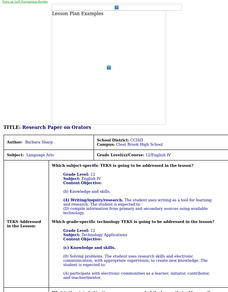Curated OER
General Greene to General Marion: Your State is Invaded, Your All is at Stake
Third graders examine the contributions of Francis Marion and Nathaneal Greene. In this Revolutionary War lesson, 3rd graders use primary and secondary sources to research Marion and Greene and the accomplishments of their men during the...
Curated OER
The Voices of Slavery
Fourth graders recognize and can describe the settlers of Early America. In this American colonies lesson, 4th graders research using primary and secondary sources, Native Americans, Europeans, and African Americans role in the colonies....
Curated OER
Secession: A Southern Perspective
Eighth graders determine how secession impacted South Carolina as well as the United States. In this American Civil War instructional activity, 8th graders examine selected primary and secondary sources in order to study the state's...
Curated OER
“Will I or Won’t I?” Colonel Robert Gould Shaw, 54th Massachusetts Regiment
Students discover the story of the 54th Massachusetts Regiment. In this American Civil War lesson, students study the life of Robert Gould Shaw and the regiment he led. Students research primary and secondary sources to learn about the...
Curated OER
Kensington Mansion: Plantation, Sharecroppers, Tenants
Eleventh graders investigate the significance of the Kensington Mansion. In this South Carolina history lesson, 11th graders take field trips to the mansion and research primary and secondary sources about plantations, sharecropping, and...
Curated OER
Turn of the Century Immigration
Students explore the immigration wave that hit the United States in 19th century. In this immigration lesson, students examine primary and secondary sources to determine what the immigration experience was like for new citizens. Students...
Curated OER
"Pitchfork" Ben Tillman and Political Reform in South Carolina
Eleventh graders examine the political reform movement in South Carolina spearheaded by "Pitchfork" Ben Tillman. In this South Carolina history lesson, 11th graders examine primary and secondary sources regarding Tillman and his vision....
Curated OER
Site and Situation: Right Place at the Right Time
Students put their geography skills to work. For this geography skills lesson, students research maps and other primary and secondary sources to simulate the site selection process for the Pennsylvania Railroad Shops post World War II....
Curated OER
The Grapes of Wrath: Scrapbooks and Artifacts
Students interpret historical evidence presented in primary and secondary sources. In this Great Depression lesson, students read John Steinbeck's The Grapes of Wrath and use ethnographic research processes...
Curated OER
Critically Examining, Analyzing and Evaluating Picture Books on Aboriginal Canada
Students combat pervasive stereotypes. In this Critical Analysis lesson plan, students examine and evaluate the stereotypes of Aboriginal groups, as depicted in a picture book. Students will use primary and secondary sources to compose...
Curated OER
Week 3: Pollution Source and Effects
Lab groups set up an experiment to observe what happens over time in collected pond water when fertilizer, representing pollution, is added. This website does not include student lab sheets, but background information, materials, and...
Curated OER
Assessing Research Materials
Teaching learners how to evaluate a research source is an important part of the research process. The fresh idea here is that groups first develop a list of reasons why resources should be evaluated, transform these reasons into...
Curated OER
Cultural Inquiry Lesson 2B: Finding Artifacts and Analysis
Students build on their knowledge of sources, by looking at 2 types of information sources: artifacts or primary sources and analysis or secondary sources. They brainstorm a list of primary and secondary sources connected to one of...
Curated OER
Oral Histories
Students determine the importance of primary source history information. They differentiate between primary and secondary source information and conduct an interview with a primary source. They gain a real life perspective about recent...
Curated OER
From Smithson To Smithsonian, The Birth Of An Institution
Students evaluate historical sources. In groups, students explore the differences between a primary and secondary source. They examine the importance of evaluating sources and using credible ones when writing reports. Students...
Curated OER
Religions of the World
A perfect resource for encouraging an understanding of the world's religions and note taking skills. Text is broken into a classic note taking style, ideal for teaching good habits. Content includes a break down of major religions,...
Humanities Texas
A President's Vision: Lyndon Baines Johnson
Learners take a closer look at the presidency of Lyndon B. Johnson, including the Great Society and the passage of the Voting Rights Act, through image analysis and primary source worksheets.
PBS
Democracy in Action: Freedom Riders
This is a must-have resource for every social studies teacher covering the civil rights movement. Through an engaging video and detailed viewing guide, young historians learn about the Freedom Riders, and discover how everyday...
American Battle Monuments Commission
Americans in Great Britain: 1942-1945
Watch the pivotal moments of America's presence in embattled Britain during World War II with an exceptional interactive tool. From personal stories about life on the front lines to a map that tracks every group and division throughout...
Curated OER
A Hoosier Perspective on the March to the Sea: The Diary of William Miller
Eighth graders take a closer look at Sherman's March to the Sea. In this American Civil War lesson, 8th graders analyze the diary entries of William Miller. Discussion questions are included with the entries. Students create illustrated...
Curated OER
Civil War Battles: The Reporter's Perspective A WebQuest
Young scholars interpret historical evidence presented in primary and secondary resources. In this research skills instructional activity, students research the job of reporting for new agencies during the American Civil War as they...
National History Day
Why Did the United States Enter World War I in 1917?
World War I was the first major conflict on a global scale. Using primary documents, learners determine why the United States chose to enter World War I when it did. After analytical writing and group research, the causes of America's...
Curated OER
Research Paper on Orators
Twelfth graders identify the difference between a primary and a secondary source, and use writing as a tool for learning and research. They compile information from primary and secondary sources using available technology.
Curated OER
A Colony is Born : Lesson 2 - Sez Who?
Second graders increase their baseline knowledge of primary and secondary sources and the likenesses and differences of them with regard to a selected historical event.
Other popular searches
- Primary and Secondary Sources
- Primary Secondary Sources
- Primary vs Secondary Sources
- Primary & Secondary Sources
- Primary, Secondary Sources
- Teaching Secondary Sources
- Primary vs. Secondary Sources

























